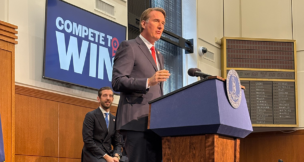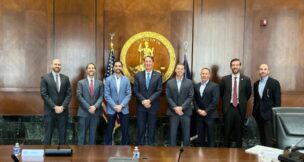Head cheerleader
Fairfax County has boomed during Gordon’s tenure at its economic development authority
Jack Cooksey //October 30, 2018//
Head cheerleader
Fairfax County has boomed during Gordon’s tenure at its economic development authority
Jack Cooksey //October 30, 2018//
Considering the big question of the year — where will Amazon locate its highly coveted second headquarters? — many oddsmakers put Northern Virginia at the top of the list.
If that prediction comes true, it might crown the legacy of one man in particular: Gerald L. “Jerry” Gordon, the president and CEO of the Fairfax County Economic Development Authority (FCEDA). In effect, landing Amazon’s HQ2 — which is expected to employ 50,000 people — would serve as a walk-off home run for the man who has led the FCEDA through the bulk of its existence.
Gordon, who turns 68 on Nov. 3, plans to retire at year’s end. He declines to answer any questions about Amazon, which in January included Northern Virginia on a short list of 20 regions it was considering for the headquarters site. A decision is expected by the end of the year.
“The story of Jerry Gordon has been the story of Fairfax County’s growth and development,” says Sharon Bulova, chairman of the county’s Board of Supervisors.
Gordon joined the authority in 1983 and rose to its top executive position in 1987. Bulova recalls that she was elected to the board a year later when antigrowth sentiment was high among voters. “Fairfax residents thought we were growing too fast and that the growth was not managed well,” she says. “Those were tumultuous times.”
The county board’s chairman at the time, Audrey Moore, advocated tourism as a solution — but the early 1990s brought a brief recession and bigger problems. “Then, it was about: ‘How do we get Fairfax back in business?’” Bulova says.
Growth mode
Thus began the ascension of Gordon as the county’s chief marketer and salesman. During his tenure, employment in Fairfax has grown from 243,000 to more than 600,000. Today, the county’s roster of major employers includes Inova Health System, George Mason University and the U.S. Department of Defense, plus the headquarters of nine Fortune 500 companies, such as Capital One, Northrop Grumman, Hilton Worldwide, Volkswagen Group of America and General Dynamics.
According to Gordon, the county contains more office space than any other locality in the Greater Washington area — 117 million square feet, to be exact — amounting to 35 percent of all the office space in Virginia. In 1983, when he came on board, Fairfax had just 32 million square feet. “We have more space filled than [the rest of] Northern Virginia has space,” he says.
Gordon notes that the FCEDA was quicker than many nearby localities to assess the risk of leaning too heavily on federal contracting as an anchor of the local economy. So, in the late 1990s, Gordon and his team began to diversify their targets and, in time, turned Fairfax into a mosaic of industries. The result is a local economy that can withstand, somewhat, stormy weather in any industry.
The year 2009 saw a flurry of high-profile relocations to Fairfax: CSC (now DXC Technology) pulled up stakes from El Segundo, Calif.; Hilton left Beverly Hills; and Volkswagen moved from Michigan.
When asked about his most difficult deal, Gordon answers simply: “All deals are difficult in different ways.”
Accolades
Leading a group with such a magic touch led Virginia Business magazine to name Gordon its 2010 Virginia Business Person of the Year and include him in its annual list of 50 Most Influential Virginians.
His career accomplishments also have been recognized by the International Economic Development Council, the Israel Bonds organization, the Catholic University of America and the Virginia Hispanic Chamber.
Gordon demurs still when asked to pick an accomplishment that he’s most proud of — there is no one favorite recruitment success that he’ll name.
Instead, “the thing I’m most proud of,” he says, “is having an extraordinary staff.”
He ticks off a list of the assets he’s recruited to his team of more than 40 professionals, including people with industry-specific knowledge, marketing acumen and focused research skills. “Across the board, they’re very strong because this region is very diverse,” he says.
The FCEDA’s reach goes well beyond the region, of course.
“We developed an international footprint,” says Fairfax Supervisor Pat Herrity. In addition to U. S. offices in Tysons and Los Angeles, the authority has locations in Bangalore, Berlin, London, Seoul and Tel Aviv.
Herrity notes that Gordon’s success is enabled by the strength of the product FCEDA has to offer: diverse demographics, a highly educated workforce, solid schools and comfortable neighborhoods. “Marketing the county is really telling a story,” Gordon explains.
Too pro-Fairfax?
It could be argued, as a recent column in the Washington Business Journal noted, that Gordon has focused intently on selling Fairfax at the expense of promoting the region at large. “I think that’s a fair assessment,” Bulova says.
Nevertheless, the county board chairman notes that: “He has been pro-Fairfax, and that has been his mission. He’s done a terrific job.” Herrity and Cathy Lange, who chairs the FCEDA board, echo that statement.
Lange, a partner at Human Capital Advisors, adds: “His competitive nature is appropriate” for what he has been asked to do.
Herrity points to the fact that Gordon has, in fact, coalesced regional cooperation on issues such as transportation and that the capital investment needed for certain developments in the county meant reaching beyond Fairfax’s boundaries. “You don’t solve that problem locally,” he says. “You have to solve that regionally.”
Both county supervisors point out, too, that Fairfax joined Loudoun County in pitching one Northern Virginia site to Amazon for HQ2.
Bulova says that whoever replaces Gordon — the search has just begun — will be challenged to broaden FCEDA’s scope toward more regional partnerships.
Teacher and author
Gordon has proved himself to be a dynamo, a man whose activities extend over the bounds of the economic development authority.
Beyond the job, he has taught classes at Catholic University, the University of Maryland, George Mason University and Virginia Commonwealth University. He’s dispensed his knowledge on strategic planning and economic development in 13 books.
Gordon’s idea of retirement, it seems, may not be quite as sedate and recreational as most business people who hang up the suit.
His plans include a move to a Seabrook Island just south of Charleston, S.C., with his wife, Barbara, to be closer to family living in the area. The move will mark a return to Gordon’s old college town. He earned his bachelor’s degree from The Citadel. Gordon also holds a master’s degree from The George Washington University and a doctorate in international economics from Catholic University.
Whether he will continue writing books is an open question. “I think I need to settle in a bit,” he says.
He will continue to teach as a fellow at the College of Charleston’s Joseph P. Riley Jr. Center for Livable Communities.
As Gordon’s economic development career comes to a close, the question hangs there: Will Fairfax win the crowning jewel of Amazon and will his victory lap be that much sweeter?
In any case, Herrity says, Gordon gave his all. “When it came to winning one for the home team,” the supervisor says, “He won for the home team.”130
a













